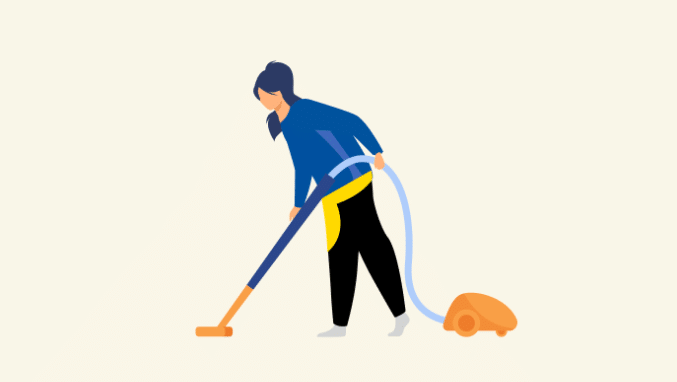Request An Estimate
Getting the kids involved with routine cleaning chores is the perfect way to teach valuable life skills and get more done around the house. A cleaning chart for kids is a great way to keep track of the chores you delegate and create fun along the way. You’ll find a handy, printable weekly chore chart is a good start, but there are a few things you need to know to make your project a success.
The Right Job for the Right Kid
All children have different skill levels and age is just one factor to consider when matching kids with the right chores. Before you fill out your cleaning chart for kids, review the recommendations below and consider mental maturity, physical ability and level of interest besides age. When you take the time to pick the right job for the right kid, you both have a much greater chance of success.
Toddlers
Most toddlers up to around four years old love to help out with chores so making things fun and exciting is critical for keeping their enthusiasm high. Kids at this age need a visual reminder of their progress, and a sticker cleaning chart for kids is a terrific choice. You’ll probably have to spend more one-on-one time at this age level, but the quality time together and the positive habits you’ll create are worth the effort.
- Make the bed together
- Clean up toys and other belongings
- Gather dirty clothes and put them in the hamper
- Feed your pets together
- Help with any messes or spills
- Dust with Microfiber cloths (skip the furniture sprays)
- Mop and sweep together (a kid-sized broom really adds to the fun with this one)
Preschoolers
Around the ages of four or five, kids still love to help and crave quality time with their parents. The best part about this age group is, with a little hands-on help, most kids can quickly take over their responsibilities with little ongoing supervision. Since this age group is typically more mentally advanced than toddlers, they are motivated by rewards for completing chores. A sticker chart still works great at this age as long as it’s easy to understand and helps kids track their rewards to see how their hard work is paying off.
- Set and clear the table
- Help load the dishwasher (for more fun, why not wash dishes together the old-fashioned way!)
- Cook together (kids love to measure ingredients, stir and other cooking tasks)
- Put groceries away
- Keep their room and play areas picked up
Six to Eight-Year-Olds
Children at these ages usually crave independence so keep that in mind when you assign their chores on your cleaning chart for kids. School-aged kids may have lost a little of their “blind” enthusiasm, but they make up for it with their quest for independence. This is also an age group that wants to make up their own minds. Try to assign them chores they enjoy or at least don’t hate! And don’t forget the rewards. Allowances, more tv time and other incentives work great at these ages.
- Feed and water pets
- Vacuum, sweep and mop
- Take out the trash and help with recycling
- Fold and put away laundry (especially their own)
- Help with younger children
- Get the mail (this one seems to be a favorite for all ages!)
Preteens
Kids aged nine to twelve have a firm grasp of cause and effect, so keep those rewards coming. This age group is also developing an appreciation of routines with clear expectations. Letting preteens help with the scheduling and tracking gives them a sense of ownership and goes a long way toward keeping their interest. While you still want to use a cleaning chart, remember the goal is to get the kids to do their work, so don’t be afraid to change things up. Any of the chores above for younger children will work for this age group, but keep in mind the desire to prove their independence and increasing capabilities are strong. You may be better off giving them chores that require more effort and skill.
- Help wash the car
- Load and unload the dishwasher
- Prepare meals together (don’t be afraid to let them take the lead once they get going)
- Clean the bathrooms (be mindful of potentially harmful cleaners)
- Rake leaves, pick up debris and other yard work
Teens
Most teens can take on nearly any chore as long as they know how to do it. But with this increased capability comes a hurdle parents must prepare for if they want to keep things rolling. Along with your cleaning chart, you’ll want to monitor your teens’ busy schedules and activities because you don’t want to overwhelm them. Even with the right incentives and good planning, teens can quickly come to resent chores if they feel overloaded. When you plan well and stay tuned-in to your teen’s frame of mind, you can delegate many “grown-up” chores successfully.
- Change out light bulbs, indoor air filter and vacuum cleaner bags
- Do the laundry
- Clean windows
- Clean out refrigerators and clean other appliances
- Create grocery lists and help with the shopping
- Other routine maintenance and cleaning
How Doing Chores Teaches Kids Valuable Life Lessons
Although each age group presents its own challenges, kids of all ages benefit from taking responsibility for chores. Research shows children who are responsible for chores have higher self-esteem, are more responsible and are better able to deal with frustration. These benefits contribute to more success in school and in adult life later on.
The life lessons learned and increased self-esteem experienced by kids who grow up doing chores has a direct impact on their ability to function competently as an adult.
- Being responsible for chores gives kids an increased sense of belonging. Their contributions to the family teach them that teamwork and helping others is an important part of healthy relationships.
- Holding kids accountable for their chores increases their perception of themselves as responsible which can lead them to seek more responsibility.
- Completing chores makes kids feel more competent and gives them a sense of fulfilling their obligations. This sense of accomplishment prepares them for more difficult challenges as they grow up.
- By teaching children to complete self-care tasks and household chores, parents equip kids with the skills to function independently in the outside world. The increased independence and appreciation of interdependence means kids can build mutually beneficial relationships in adulthood.
- Working with a schedule and a cleaning chart, kids learn how to prioritize and manage their time. Getting the most important tasks completed in a timely manner is one of the best lessons any child can learn.
- Holding children accountable for chores means teaching them what is important to you and what you think should be important to them. Hard work, discipline and other elements every successful adult needs are a natural byproduct of this accountability.
- Not every child will experience accolades at school or in sports. Having them take on the responsibility of completing chores gives them feelings of self-worth they may not find elsewhere.
Making Sure Things Get Done
By making things fun and rewarding kids appropriately, you’ll have a better chance of success. But sometimes you’ll encounter resistance to your well-designed chore chart so here are tips to keep things moving.
Remember, it’s the journey, not the destination. If you want kids to learn those valuable lessons, then “good” has to be good enough. By taking a relaxed approach with your expectations, you can help children become more skilled while they realize it’s okay not to get things perfect.
Start early and build your child’s success. If you’re waiting until you think your kids are ready to take on responsibility, you’re missing the point because they learn by watching and doing. Even very young children can follow basic directions, and they naturally mimic parents’ behaviors. Your kids are more capable than you may think.
Praise even the smallest success. Kids love praise and for younger children that may be the best incentive of all so don’t wait until the chore is complete. Keep their enthusiasm alive by giving them an “A” for effort. Remember how patient and encouraging you were when your little ones were learning to walk? That’s precisely the praise and pats on the back kids need while they learn.
Consistency builds buy-in. You created the perfect cleaning chart for kids. You took the time to assign the most compatible chores and you’ve been patient, understanding and a real team player. Don’t mess all that up by being inconsistent with expectations and consequences. By sticking to your chore schedule, following up when chores are completed and making expectations (and consequences) as clear as possible, you’ll develop the consistency that helps children thrive.
Request An Estimate










